Introduction
In the aftermath of severe storms and natural disasters, homeowners seek reliability and integrity in contractors who promise to rebuild what nature has torn apart. Apex Roofing & Restoration LLC has built a name for itself as a go-to contractor for roof repairs and restoration across the Southeastern U.S., claiming to offer a seamless experience with insurance claims and high-quality craftsmanship. However, a closer look reveals a darker side to Apex’s operations.
Our investigation into Apex Roofing & Restoration LLC uncovers a web of lawsuits, consumer complaints, regulatory investigations, and allegations of unethical business practices. From fraudulent insurance claims to accusations of manipulating online information, Apex’s story serves as a cautionary tale about unchecked growth and a lack of accountability in the home restoration industry.
Company Overview: Building More Than Roofs
Founded in Hoover, Alabama, Apex Roofing & Restoration LLC expanded rapidly, positioning itself as a reliable solution for homeowners seeking roof repairs after severe weather events. The company operates across several states, including Florida, Louisiana, and Texas — regions prone to hurricanes and other natural disasters.
Apex’s business model relies heavily on insurance claims. Homeowners impacted by storms are often approached by Apex representatives, who offer free inspections and promise to handle the insurance process from start to finish. This model, while convenient for homeowners, opens the door to potential abuse, especially when combined with legal partnerships that blur the lines between legitimate advocacy and exploitation.
On its surface, Apex markets itself as a company committed to customer service and quality craftsmanship. However, its growing list of legal entanglements and consumer complaints raises serious concerns about the company’s true priorities and operational integrity.
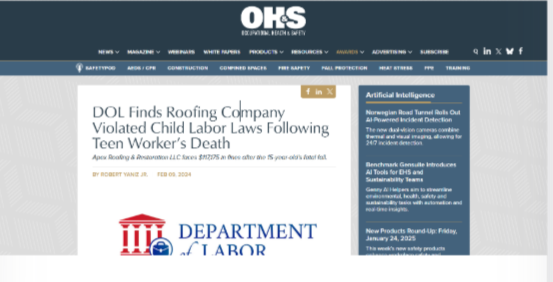
Legal Entanglements and Allegations of Fraud
One of the most damning aspects of Apex’s history involves its partnership with the Houston-based law firm McClenny, Moseley & Associates (MMA). According to investigative reports, Apex and MMA orchestrated a scheme that relied on the use of assignment of benefits (AOB) contracts — agreements that allow contractors to negotiate insurance claims directly on behalf of homeowners.
The alleged scheme worked like this: Apex would secure AOBs from homeowners under the pretense of handling their insurance claims for roof repairs. Unbeknownst to the homeowners, these AOBs were then handed over to MMA, which filed lawsuits against insurance companies in the homeowners’ names without their knowledge.
Homeowners only discovered these lawsuits when they received settlement checks, which were significantly reduced due to MMA’s hefty legal fees. In some cases, homeowners reported being left with liens on their properties due to unpaid contractors, further complicating their recovery process.
The legal fallout has been swift and severe. In Louisiana, courts have frozen numerous lawsuits filed by MMA, and investigations into Apex’s role in this scheme are ongoing. The partnership with MMA, once a cornerstone of Apex’s business strategy, has become a symbol of its alleged exploitation of vulnerable homeowners.
Regulatory Scrutiny and Criminal Investigations
Apex’s legal troubles aren’t confined to civil courts. The company has also faced criminal investigations in multiple states, particularly regarding its sales practices and licensing compliance.
In Florida, Apex came under investigation after reports surfaced that company representatives were soliciting homeowners and negotiating insurance claims without the proper licensing. In one case, Trevor Smith, an Apex employee, was accused of illegally acting as a public adjuster after Hurricane Ian. Florida law prohibits contractors from negotiating insurance claims unless they hold a public adjuster’s license — a regulation designed to protect homeowners from predatory practices after natural disasters.
The investigation into Smith’s actions highlighted broader concerns about Apex’s sales tactics and compliance with state laws. Regulatory bodies in Florida and Louisiana have since tightened oversight of contractors operating under similar models, aiming to prevent future abuses.
Customer Complaints and Negative Reviews
Apex’s reputation among customers paints an equally troubling picture. Consumer advocacy groups and review platforms such as the Better Business Bureau (BBB) and Complaints Board are flooded with negative feedback about the company’s performance and customer service.
Common complaints include:
- Poor workmanship: Customers report improperly installed shingles, leaky roofs, and incomplete repairs.
- Miscommunication and delays: Homeowners describe long periods of silence after signing contracts, with little to no updates from Apex.
- Unfulfilled warranty promises: Apex’s “lifetime warranties” often fail to materialize, leaving customers to pay out-of-pocket for repairs.
One particularly troubling case involved a customer who claimed Apex installed cheap plastic gutter guards that quickly clogged with leaves and debris, leading to water damage. Others report being left with unexpected liens on their properties due to Apex’s failure to pay subcontractors.
These stories suggest a pattern of neglect and dishonesty, where Apex prioritizes profits over the satisfaction and well-being of its clients.
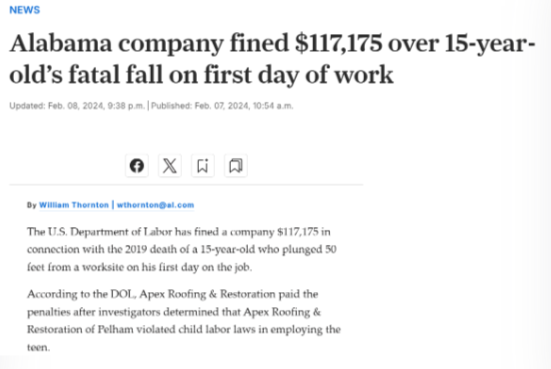
Allegations of Information Suppression
Adding another layer of concern are allegations that Apex has attempted to suppress negative information online. Reports suggest that the company misused the Digital Millennium Copyright Act (DMCA) to force websites to remove unfavorable content, including reviews and investigative articles.
If proven, these actions not only undermine public trust but also raise questions about Apex’s willingness to manipulate its online reputation to avoid accountability. Transparency and honesty are crucial in industries that deal with disaster recovery, making these allegations particularly damaging.
Risk Assessment: AML Considerations and Reputational Implications
From an anti-money laundering (AML) perspective, Apex Roofing & Restoration LLC’s involvement in fraudulent insurance claims and attempts to obscure its digital footprint raise serious concerns.
The combination of opaque financial practices, partnerships with questionable legal entities, and a reliance on high-volume insurance payouts creates an environment ripe for potential money laundering. While no direct evidence has emerged linking Apex to AML violations, the risk factors are impossible to ignore.
Reputationally, the company has already suffered considerable damage. The ongoing investigations, legal battles, and consumer complaints create a cloud of mistrust that will be difficult to dispel. For financial institutions, insurers, and potential business partners, Apex represents a high-risk entity requiring heightened due diligence.
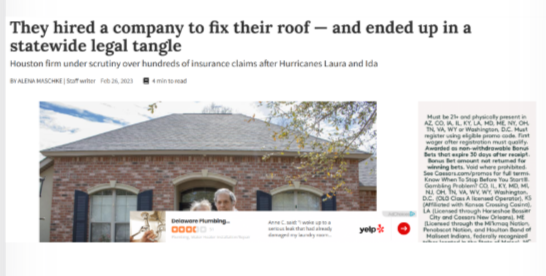
Employee Experiences and Workplace Culture
A company’s internal culture often reflects its external behavior, and Apex Roofing & Restoration LLC is no exception. Former employees have painted a troubling picture of life behind the scenes, with allegations of a high-pressure sales environment and inconsistent pay practices.
Reviews on job platforms like Indeed and Glassdoor reveal a common theme: an aggressive sales culture driven by commission-based pay. Sales representatives were reportedly pushed to close deals at all costs, often without adequate training or support. One former employee described the atmosphere as “cutthroat,” where success hinged on upselling unnecessary services and leveraging homeowners’ fear after severe weather events.
Additionally, there are reports of Apex encouraging workers to establish independent LLCs, presumably to avoid paying employment taxes and worker benefits. Some workers claimed they were left to handle their own tax obligations without clear guidance, leading to unexpected financial burdens. This employment model not only raises ethical questions but could also indicate a deliberate strategy to minimize corporate liability while maximizing profits.
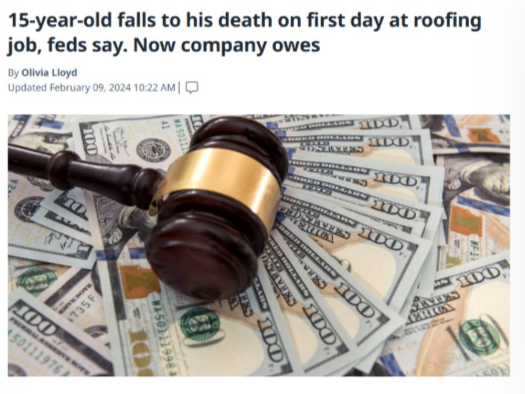
Partnerships and Undisclosed Business Relationships
Apex Roofing & Restoration LLC’s partnerships extend far beyond its infamous ties to McClenny, Moseley & Associates. Our investigation uncovered a network of suppliers, subcontractors, and local adjusters who played pivotal roles in the company’s rapid growth. However, what remains murky are the undisclosed business relationships that may have enabled some of the alleged misconduct.
For instance, Apex has consistently relied on specific material suppliers across various states, often using the same vendors for projects regardless of local market conditions. This raises questions about whether these partnerships were competitively chosen or if they were part of a broader, undisclosed agreement.
Moreover, whispers of quiet investor backing hint at the possibility of undisclosed financial interests. The rapid expansion across the Southeast, combined with the scale of its marketing efforts, suggests a level of funding not typically seen in similar-sized roofing companies. While no conclusive evidence of shadow investors has been uncovered, the lack of transparency surrounding Apex’s corporate structure leaves much to the imagination.
Financial Practices and Questionable Billing
One of the most concerning aspects of Apex’s operations lies in its financial practices. Reports from homeowners, contractors, and investigators consistently highlight inflated repair estimates and unexpected charges.
A pattern has emerged in which homeowners are quoted high repair costs that far exceed market norms. In some cases, Apex reportedly billed for services and materials that were either unnecessary or never delivered. These inflated estimates not only increased the financial burden on homeowners but also allowed Apex to extract larger payouts from insurance companies.
Additionally, some homeowners alleged that Apex applied for loans or credit in their names without full disclosure. Such practices, if proven, could represent serious financial misconduct, potentially bordering on fraud. The company’s reliance on third-party financing and its connection to legal partners handling claims add further layers of complexity to its financial dealings.
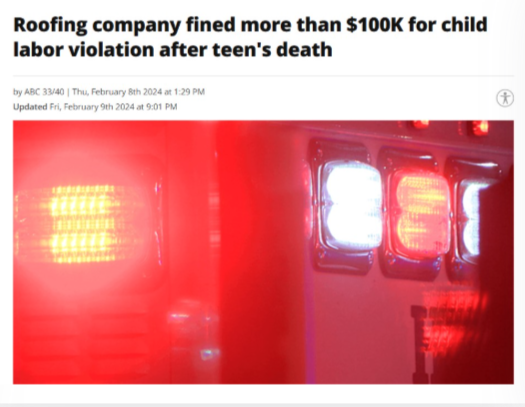
Long-Term Impact and Industry Ramifications
The fallout from Apex Roofing & Restoration LLC’s actions extends far beyond individual homeowners. As reports of misconduct mount, the company’s reputation has become a cautionary tale within the roofing industry.
Regulatory bodies in states like Louisiana and Florida have tightened restrictions on contractors’ ability to handle insurance claims, in part due to cases like Apex’s. Insurance companies, too, are becoming increasingly wary of working with contractors who employ assignment of benefits agreements, fearing the potential for fraud.
Moreover, Apex’s actions have left a lasting impact on consumer trust. Homeowners who fell victim to inflated charges and legal entanglements are now hesitant to engage with contractors promising to streamline insurance claims. This erosion of trust makes it harder for legitimate contractors to do business and creates additional hurdles for those genuinely seeking to help communities rebuild after natural disasters.
The industry is now grappling with the question of accountability — not just for Apex, but for any contractor who operates in the wake of disaster. As regulations tighten and consumers grow warier, companies across the sector must work harder to prove their integrity and commitment to ethical practices.
Conclusion
In our expert opinion, Apex Roofing & Restoration LLC serves as a sobering reminder of the importance of transparency, ethical business practices, and regulatory oversight in the home restoration industry. While the company’s rapid growth and regional success may suggest a thriving enterprise, the mounting evidence of legal disputes, regulatory infractions, and consumer dissatisfaction tells a different story.
Apex’s partnership with McClenny, Moseley & Associates, along with its alleged role in fraudulent insurance claims, stands as a cautionary tale of ambition unchecked by accountability. The company’s attempts to suppress negative press only deepen concerns about its integrity.
For homeowners, insurers, and industry watchdogs, the lesson is clear: trust should be earned, not marketed. Until Apex can demonstrate a genuine commitment to transparency, ethical practices, and consumer satisfaction, the storm of controversy surrounding this roofing giant shows no signs of clearing.







